This article was co-authored by Adarsh Vijay Mudgil, MD and by wikiHow staff writer, Sophia Latorre. Dr. Adarsh Vijay Mudgil is a board certified Dermatologist, Dermatopathologist, and the Owner of Mudgil Dermatology, a state-of-the-art dermatology practice based in New York, New York. As one of the few dermatologists in the area to achieve board certification in both dermatology and dermatopathology, Dr. Mudgil specializes in all aspects of medical, surgical, and cosmetic dermatology. He received his Bachelor's degree with Phi Beta Kappa honors from Emory University and earned his Doctor of Medicine (MD) with Alpha Omega Alpha honors from the Stony Brook University School of Medicine. In medical school, Dr. Mudgil was among a handful of students nationwide to receive a coveted Howard Hughes Medical Institute Fellowship and Scholarship. He then completed his residency in dermatology at the Mount Sinai Medical Center in Manhattan, where he served as chief resident. Additionally, Dr. Mudgil went on to complete a fellowship at the prestigious Ackerman Academy of Dermatopathology. He is a fellow of the American Academy of Dermatology, the American Society for Dermatologic Surgery, and the American Society of Dermatopathology. Dr. Mudgil is also a member of the Mount Sinai School of Medicine teaching faculty.
This article has been viewed 1,400 times.
Interested in firmer, more youthful skin, healthier hair and nails, and stronger joints, muscles, and bones? A collagen supplement might be just what you need. Our bodies naturally produce collagen, but production decreases as we age. Fortunately, collagen supplements are safe and effective. We’re here to help you find the collagen supplement with the taste, texture, and price point that’s right for you. Plus, we’ll also share the best tips on increasing collagen production naturally and slowing its decline.
Steps
Natural Ways to Increase Collagen Production
-
1Get more vitamin C. Vitamin C is essential to your body’s ability to produce and maintain collagen. It also supports the immune system, skin, healthy hair, and body tissue. Increase your vitamin C by eating more vitamin C-rich foods such as citrus fruits, broccoli and strawberries. You can also try vitamin C supplements or vitamin C-infused juices.
- The minimum recommended amount of vitamin C for the average adult is 75 mg daily for women and 90 mg daily for men. That’s equal to a cup of oranges.
- While consuming more than 90 mg of vitamin C is not necessarily dangerous, large doses may cause diarrhea, nausea, or vomiting.
- Most people get enough vitamin C through their diet. However, some people experience vitamin C deficits, especially later in life. Signs of a vitamin C deficiency include bruising, bleeding gums, weakness, and fatigue. Additional side effects include dull or rough skin, coiled body hair, concave fingernails, and anemia.
-
2Eat more antioxidant-rich foods. Like vitamin C, antioxidants promote collagen production. Add more vitamin A, lycopene, selenium, lutein, and vitamin E to your diet to protect cell membranes against oxidative damage. To incorporate more antioxidants into your diet, try eating fresh blueberries, apples, broccoli, spinach, and lentils.
- Not only are antioxidants vital for collagen production, but they can also reduce your chances of various health conditions such as cancer, heart disease, and vision loss due to age-related macular degeneration.
-
3Protect your skin from the sun. Too much sun exposure decreases your body’s collagen production and can cause skin changes, including wrinkles. Protecting your skin from harmful UV rays and help maintain your body’s collagen by:
- Wearing sunscreen. UV rays from the sun can affect your skin anytime, even if you’re only outside for a short time. Apply sunscreen daily to any parts of your body regularly exposed to the sun, including your face, neck, and hands. Be sure to reapply sunscreen at least every hour, especially if you’re sweating or swimming.
- Wearing protective clothing. Put on shoes, hats, and sunglasses to keep your feet, head, face and eyes safe. You can also wear lightweight pants and long-sleeved shirts to protect your skin from harmful UV rays.
- Avoiding tanning beds. Tanning beds use harmful UV rays that not only decrease collagen production but also contribute to sunburn and skin cancer.
Preventing Collagen Loss
-
1Stop smoking. Research shows that people who smoke have noticeable facial changes such as wrinkles, most notably surrounding the lips, forehead, and eyes. These changes in the skin happen because smoking tobacco negatively affects collagen production. Unfortunately, smoking is an addictive habit, and quitting can be really tough. Talk to your healthcare professional about treatment options if you’re having trouble putting down cigarettes.
-
2Avoid inflammatory foods. Eating antioxidant-rich foods improves collagen production, but increasing your vitamin C and other antioxidants might not make much of a difference if most of your diet contains foods that trigger inflammation. Avoid foods that are processed or full of sugar, which can lead to collagen fragmentation, weaken the skin’s foundation, and cause damage to other body tissues. Try to incorporate more fresh produce and lean meats into your diet to reduce the decline of collagen.
-
3Manage your stress. High levels of stress can lead to decreased bone health and increased inflammation, which lowers the body’s natural collagen production. Stress also triggers the production of cortisol, a hormone that can decrease collagen in the body. Finding healthy ways to manage your stress levels is essential to reducing the effects of stress on collagen.
- A few stress management tips worth trying include regular exercise, therapy, meditation, and journaling. If you have chronic stress that interferes with your daily activities, consult your health care professional for additional treatment options.
References
- https://www.mayoclinic.org/healthy-lifestyle/nutrition-and-healthy-eating/expert-answers/vitamin-c/faq-20058030#
- https://www.medicalnewstoday.com/articles/317151
- https://www.ncbi.nlm.nih.gov/pmc/articles/PMC5476783/
- https://academic.oup.com/endo/article/158/4/1005/2913382
- https://my.clevelandclinic.org/health/articles/23089-collagen
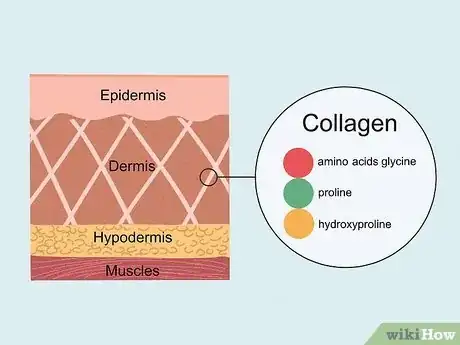
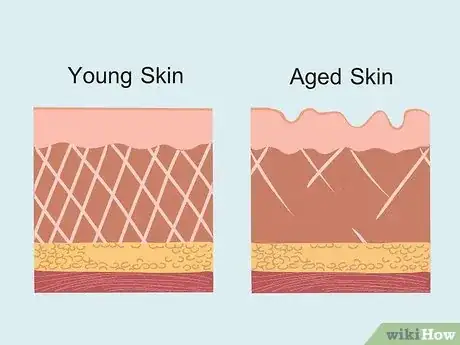

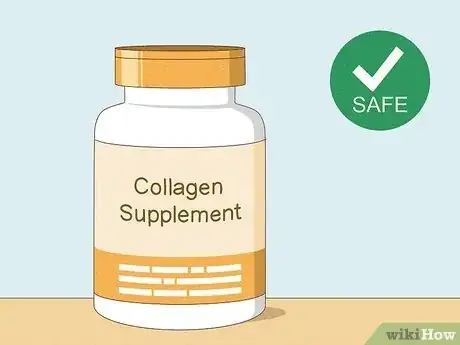
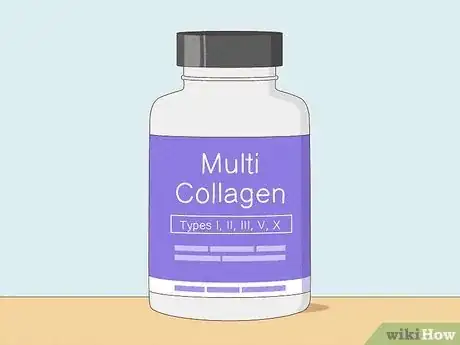
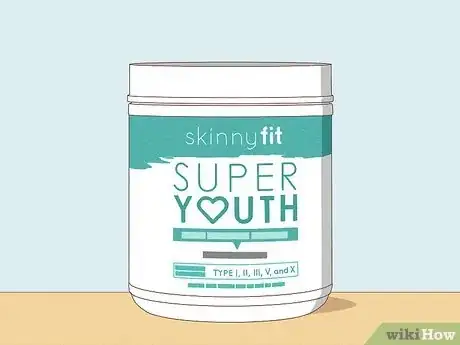
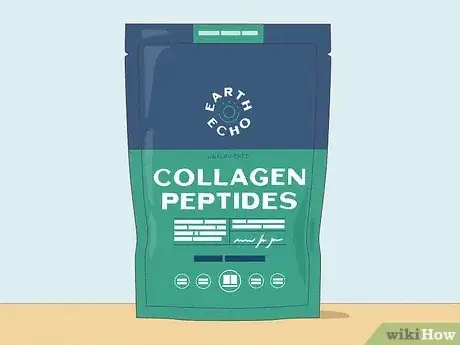

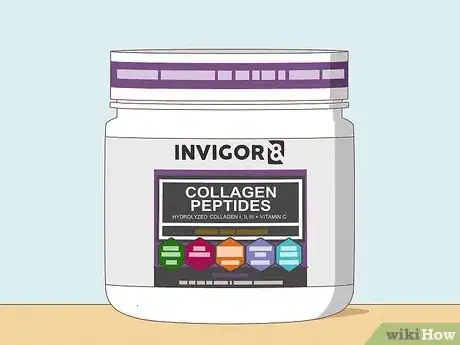




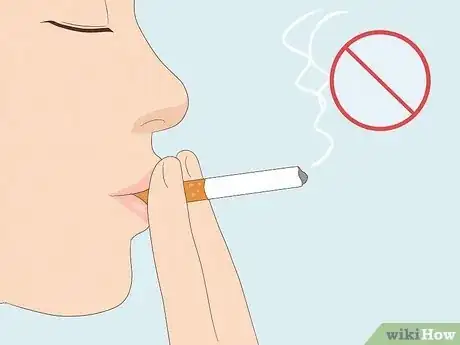
























































Medical Disclaimer
The content of this article is not intended to be a substitute for professional medical advice, examination, diagnosis, or treatment. You should always contact your doctor or other qualified healthcare professional before starting, changing, or stopping any kind of health treatment.
Read More...